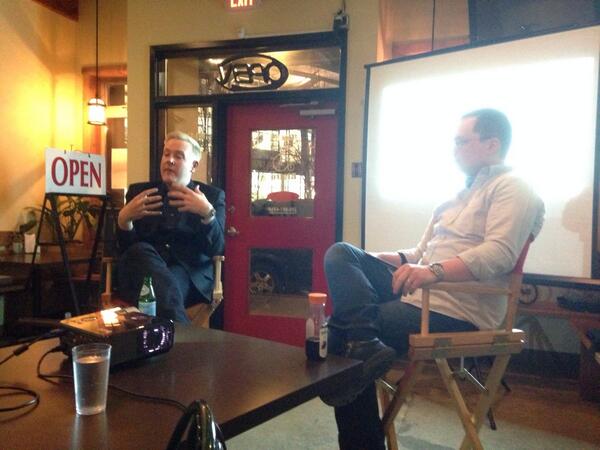
@sundaysociology and @chadkoh deep in discussion. Photo by @scdaustin
How does technology influence the social and political lives of humans? That was the central topic of discussion during the second half of last night’s OKDG event. I sat down with UBCO Professor of Sociology Christopher Schneider to talk about technology and social control.
My purpose in inviting Dr Schneider was to introduce our community of developers and designers to some of the literature and concepts used in the formal inquiry into technology and society. We talked about the use of technology in formal social control (eg. police using Facebook to identify rioters during the 2011 Vancouver Riots), in informal social control (eg. expectations about timing of social interactions due to “instantaneous” communications channels), and about unlimited tech freedom (cf. Inverse Amish link below).
We as early adopters and practitioners seldom ask ourselves about the impact of what we make on society at large. How do you determine if a new piece of tech actually contributes to “progress”? Many of us are self taught and are never exposed to “ethics” classes (nevermind the ACM’s Software Engineering Code of Ethics and Professional Practice) like other more established professions. That is why I like having these types of discussions in our community. It is a blind spot that we need to address.
NOTE: If you are looking for a quick and easy primer, I highly recommend Shannon Vallor’s module An Introduction to Software Engineering Ethics.
Anyways, Dr Schneider spoke at length and regaled us with anecdotes and dilemmas to think about. I think everyone had a good time. If you want to continue this discussion, or explore it further together, just let me know. Maybe we can do another event.
Below is a list of resources, concepts and events that was talked about that you can explore. (Thanks to @pondernook for writing all this down in realtime! I have corrected all the drunken spelling mistakes.)
Notes
Qualitative Media Analysis by Schneider and Althaide
Frame Analysis: An Essay on the Organization of Experience by Erving Goffman
Media Logic by Althaide and Snow
W.I. Thomas: “If men define situations as real, they are real in their consequences”
Cass Sunstein and Thaler “Nudging”
Crime and Everyday Life by Marcus Felson
Crime as a social necessity
Toronto Police Service social media accounts
Richard Ericson
Crowd sourced policing
1992 LA Riots, media refusing to be a “deputy”
Aaron Doyle
Data Exhaust
Documentary: Terms and Conditions May Apply
Bruce Schneier, Trust and security
Balaji Srinivasan’s idea of the “Inverse Amish“. Also see Exiting Silicon Valley
Peter Thiel (paid kids not to go to college) and building offshore utopias
Neil Postman, technopoly: the cultural state of mind that assumes technology is always positive and of value
Hatching Twitter by Nick Bilton
Sugar Hill Gang
Adam Buxton sings “Help” the Police by NWA [EDITOR’s NOTE: Too funny!]

